Bringing King to China est un film de genre Documentaire
Bringing King to China (2011)
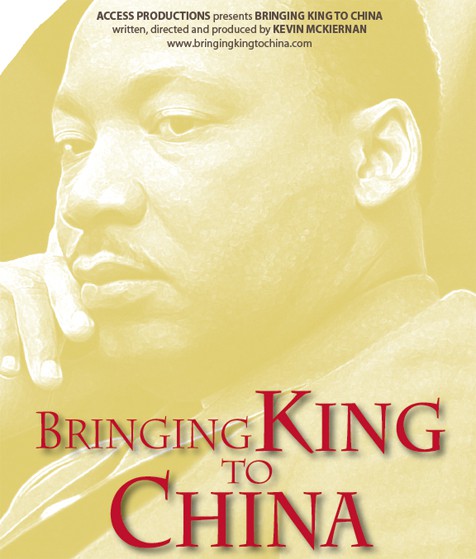
Si vous aimez ce film, faites-le savoir !
Bringing King to China is a 2011 documentary film by Kevin McKiernan. The cinematographers include three-time Oscar-winner Haskell Wexler.
The documentary is "a father's 'love letter' to his adult daughter, a young American woman struggling to bring Martin Luther King, Jr.'s dream of nonviolence to China, and then back to the United States. Her life is thrown into turmoil when she learns, mistakenly, that her father, a journalist covering the war in Iraq, has been killed by a suicide bomber."
Bringing King to China conveys the lead character's "dream to build a bridge between the societies by talking about peaceful struggle and universal rights." It chronicles her struggle to interpret and adapt King's message for Chinese society, preserve the historical accuracy of the U.S. civil rights movement, clear bureaucratic hurdles before opening night and raise funds to pay the theater company. The film takes American viewers backstage at the National Theatre Company of China, as Chinese actors rehearse with African-American gospel singers.
The film premiered at the Santa Barbara International Film Festival and won best documentary at the Ventura International Film Festival and the Tulsa International Film Festival. In 2011, it was scheduled to screen at film festivals across the US, including DOCNYC and the St. Louis International Film Festival.
Commentators called the film timely, noting it premiered in the lead-up to the unveiling of the Martin Luther King, Jr. Memorial in Washington, D.C.
Commentaires
Postez un commentaire :
Suggestions de films similaires à Bringing King to China
Il y a 8954 ayant les mêmes genres cinématographiques, 3221 films qui ont les mêmes thèmes (dont 196 films qui ont les mêmes 3 thèmes que Bringing King to China), pour avoir au final 70 suggestions de films similaires.Si vous avez aimé Bringing King to China, vous aimerez sûrement les films similaires suivants :

Genres Documentaire
Thèmes Afrique post-coloniale, La musique, Le racisme, Documentaire sur la discrimination, Documentaire sur le droit, Documentaire sur la musique, Documentaire sur une personnalité, Documentaire sur la politique, Musique, Politique
Acteurs Walter Cronkite, Hugh Masekela, Miriam Makeba
Note73%





In the film, South African musicians, playwrights, poets and activists recall the struggle against apartheid from the 1940s to the 1990s that stripped black citizens of South Africa of basic human rights, and the important role that music played in that struggle. The documentary uses a mixture of interviews, musical performances and historical film footage. Among the South Africans who take part are Miriam Makeba, Abdullah Ibrahim, Hugh Masekela, Vusi Mahlasela and others.

Too Colourful for the League (2001)
, 52minutesOrigine Canada
Genres Documentaire
Thèmes Le racisme, Sport, Documentaire sur le sport, Hockey sur glace, Documentaire sur la discrimination, Documentaire sur le droit, Documentaire sur une personnalité
Note63%





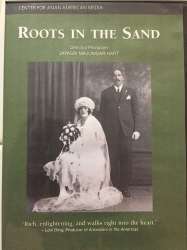
United Gates of America (2007)
, 1hOrigine Royaume-uni
Genres Documentaire
Thèmes L'immigration, Le racisme, Documentaire sur la discrimination, Documentaire sur le droit, Documentaire sur une personnalité, Documentaire sur les villes
 , 1h41
, 1h41Réalisé par Rithy Panh
Origine France
Genres Guerre, Documentaire, Historique
Thèmes Politique, Le racisme, Documentaire sur la discrimination, Documentaire sur le droit, Documentaire sur la guerre, Documentaire historique, Documentaire sur une personnalité, Politique
Note71%





Au Cambodge, sous les Khmers rouges, S21 était le principal « bureau de la sécurité ». Dans ce centre de détention, un ancien lycée situé au cœur de Phnom Penh, près de 17 000 prisonniers ont été torturés, interrogés puis exécutés entre 1975 et 1979. Sept seulement ont survécu. Au moment du tournage, seuls trois d’entre eux étaient encore en vie, dont deux reviennent vingt-cinq ans plus tard témoigner (parmi lesquels le peintre Vann Nath), lors d'une confrontation avec leurs bourreaux.

Rwanda pour mémoire (2003)
, 1h8Réalisé par Samba Félix Ndiaye
Origine France
Genres Documentaire
Thèmes Afrique post-coloniale, Film sur un écrivain, Le racisme, Documentaire sur la discrimination, Documentaire sur le droit, Documentaire sur la guerre, Documentaire historique, Documentaire sur une personnalité, Documentaire sur la politique, Politique
Entre avril et juillet 1994, le massacre Tutsis et des Hutus modérés a fait un million de morts. À l’initiative de Fest’Africa, une dizaine d’auteurs africains se sont retrouvés en résidence d’écriture à Kigali, quatre ans après les évènements, cherchant à briser le silence des intellectuels africains sur le génocide.
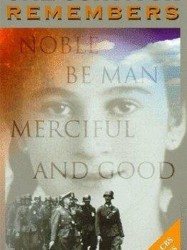
One Survivor Remembers (1996)
, 39minutesOrigine Etats-Unis
Genres Documentaire, Historique
Thèmes Le racisme, Religion, Documentaire sur la discrimination, Documentaire sur le droit, Documentaire sur la guerre, Documentaire historique, Documentaire sur une personnalité, Documentaire sur la religion, Politique, Religion juive, Documentaire sur la Seconde Guerre mondiale
Acteurs Peter Thomas
Note78%





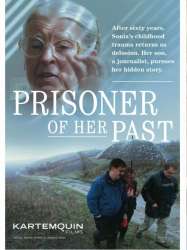
Prisoner of Her Past (2010)
, 57minutesOrigine Etats-Unis
Genres Documentaire
Thèmes Maladie, Le racisme, Religion, Documentaire sur la discrimination, Documentaire sur le droit, Documentaire sur la guerre, Documentaire historique, Documentaire sur une personnalité, Documentaire sur la religion, Documentaire sur la santé, Folie, Le handicap, Politique, Religion juive, Documentaire sur la Seconde Guerre mondiale
Note74%






Ha-Makah Hashmonim V'Echad (1974)
, 1h55Origine Israel
Genres Documentaire
Thèmes Le racisme, Religion, Documentaire sur la discrimination, Documentaire sur le droit, Documentaire sur la guerre, Documentaire historique, Documentaire sur une personnalité, Documentaire sur la religion, Politique, Religion juive, Documentaire sur la Seconde Guerre mondiale
Note75%






Forget Us Not (2013)
Réalisé par Heather E. Connell
Origine Etats-Unis
Genres Documentaire
Thèmes Le racisme, Religion, Documentaire sur la discrimination, Documentaire sur le droit, Documentaire sur la guerre, Documentaire historique, Documentaire sur une personnalité, Documentaire sur la religion, Politique, Religion juive, Documentaire sur la Seconde Guerre mondiale
Acteurs Ron Perlman
Note72%





Forget Us Not is a look at the persecution and death of the 5 million non Jewish victims of the World War II Holocaust, and the lives of those who survived including:
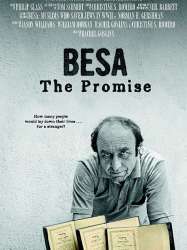
Besa: The Promise (2012)
Réalisé par Rachel Goslins
Genres Documentaire
Thèmes Le racisme, Religion, Documentaire sur la discrimination, Documentaire sur le droit, Documentaire sur la guerre, Documentaire historique, Documentaire sur une personnalité, Documentaire sur la religion, Politique, Religion juive, Documentaire sur la Seconde Guerre mondiale
Note77%





 Connexion
Connexion